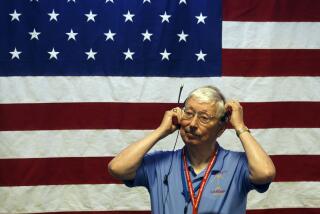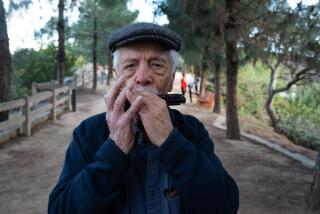Sir Wilfred Thesiger, 93; Last of a Breed of British Explorer-Adventurers
- Share via
Sir Wilfred Thesiger, a celebrated British explorer who twice crossed a vast Saudi Arabian desert by camel, lived among the marsh dwellers of southern Iraq and risked his life to discover why Ethiopia’s Awash River does not reach the sea, has died. He was 93.
Thesiger, who had lived in a retirement home in Coulsdon, England, in recent years, died Sunday in a London hospital. The cause of death was not disclosed.
The last of a breed of British explorers who traveled through unmapped, often dangerous parts of the globe in the years before travel turned into tourism, Thesiger spent a lifetime seeking adventure in out-of-the-way places.
“I’ve traveled with animals and porters,” he told the Los Angeles Times in 1980. “I loathe cars and airplanes, but I didn’t travel on a camel because I thought it was fun: By the face of God, it was the only way.”
Thesiger recorded his adventures in many books, including “Arabian Sands” (1959), “The Marsh Arabs” (1964) and “The Last Nomad” (1980).
A book reviewer for Time magazine once described those three books as being distinguished by “a direct and bone-dry style that balances Thesiger’s luxuriantly romantic relish for tribal peoples and desolate places.”
Dutch writer and traveler Ian Buruma wrote of Thesiger in a 1988 essay: “He is the quintessential English eccentric, forever embarking on impossible adventures in impossible countries, among impossible people; the well-bred aristocrat reveling in excruciating discomfort and horrid food.”
Thesiger developed a taste for adventure at an early age. He was born in a mud-and-thatch compound on June 3, 1910, in Addis Ababa, the capital of Abyssinia -- now Ethiopia -- where his father was the British legation minister.
At age 6, he watched the triumphant army of the emperor of Abyssinia return from battle carrying the bloodstained cloaks of the revolutionaries they had killed -- a sight, he later wrote, that “implanted in me a lifelong craving for barbaric splendor, for savagery, color and the throb of drums.”
At 7, he traveled with his parents to India, where his uncle was viceroy and where his father took him on a tiger hunt.
In 1919, his family returned to England, where he was sent to St. Aubyn’s boarding school. When he told his classmates his tales of lion and tiger hunts and spear-wielding warriors, they called him a liar and beat him.
“Perhaps I’d have grown up a softie if it hadn’t been for that school,” he told The Times.
The Eton and Oxford University-educated Thesiger, who had been invited by family friend Haile Selassie to his coronation in Abyssinia in 1930, returned there again in 1933 to embark on his first perilous expedition: to find out why the Awash River in the harsh badlands of the eastern part of the country does not reach the sea.
That the area was dominated by the ferocious Danakil tribe -- and that three previous European expeditions had vanished -- apparently did not bother the 23-year-old Thesiger, who received financial help for the expedition in part from the Royal Geographic Society.
As he explained decades later: “This river that flowed where nobody knew -- good Lord, how could you resist it?”
After a failed first attempt, Thesiger made a second expedition in 1934 and earned his reputation as an explorer by establishing that the Awash flows into the Abhebad salt lake.
From 1935 to 1940, he served with the Sudan Political Service in the administration of British-occupied Sudan, where he was often called on to shoot cattle-killing lions.
He hunted down the animals on foot, accompanied by spear-bearing villagers.
During World War II, Thesiger joined the Sudan Defense Force and later served as a commando in the British Special Air Service in North Africa.
After the war, he launched what has been called his greatest adventure. Employed to gather information on the breeding sites of the desert locust in Saudi Arabia, he was allowed to roam unsupervised through the country’s deserts.
He used the opportunity to explore the vast desert known as the Empty Quarter. Traveling by camel with Bedouin tribesmen, he made two crossings from 1946 through 1948.
“I was exhilarated by the sense of space, the silence,” he wrote in “The Life of My Choice,” his 1987 best-selling autobiography.
“I felt in harmony with the past, traveling as men had traveled for untold generations across the desert.”
In the 1950s, he spent seven years living off and on among the Madan Arabs of southern Iraq, where he gathered rare specimens of reeds, rushes and water plants for the British Museum.
He then returned to Africa to explore southern and northern Ethiopia.
“Among the Mountains: Travels Through Asia,” his 1998 collection of photographs and diary excerpts, chronicles his lesser-known travels in Afghanistan, Iraqi Kurdistan, Pakistan’s North West Frontier province and Nuristand from 1950 through 1965.
In the 1960s, Thesiger settled among the Samburu, a northern Kenyan tribe of cattle herders, who called him “Mzee Juu” -- the Great One.
Thesiger, who never married, later lived with the family of Lawi Leboyare, one of the Samburu tribesmen whom he is said to have adopted. Home was a tin-roofed house with no electricity or running water.
But each year for three months, he would return to London, where he lived in his late mother’s book-lined Chelsea flat and was a member of an exclusive club frequented by Oxford dons.
He moved back to England permanently in 1995.
A tall, slightly stooped man with pale-blue eyes, bushy eyebrows, neatly brushed silver hair and a hawk-like nose that had been broken while boxing at Oxford, the aging Thesiger took great pride in his years of traveling without modern conveniences.
“All this stuff about boiling water or putting sterilizing tablets in the water -- I’ve never boiled or sterilized water anywhere in my life, and I’ve drunk it out of every ditch and drain that I’ve been to,” he told the Associated Press in 1990.
His goal wherever he traveled, he said, was to meet the people “on level terms.”
“I wanted no concessions,” he said. “All I wanted then was to live and be as near to them as I could possibly be.
“I’ve no desire to be an Englishman when I’m traveling about.”
Knighted in 1995, Thesiger received numerous honors for his explorations, including the Founder’s Medal of the Royal Geographic Society in 1948 after he crossed the Empty Quarter; the Lawrence of Arabia Medal of the Royal Central Asia Society in 1955; and the Burton Memorial Medal of the Royal Asiatic Society in 1966.
More to Read
Sign up for our Book Club newsletter
Get the latest news, events and more from the Los Angeles Times Book Club, and help us get L.A. reading and talking.
You may occasionally receive promotional content from the Los Angeles Times.










